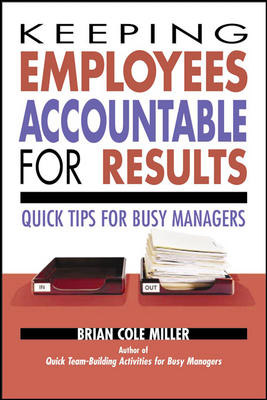Keeping Employees Accountable For Results

Keeping Employees Accountable For Results
How to make sure employees meet their goals - and yours.
All managers want to hold their employees accountable for results, but few know how. Moving beyond the far-from-ideal annual performance review - which only evaluates what has already occurred, and not what the manager wants to achieve - Keeping Employees Accountable for Results contains checklists, how-tos, and other tools to manage performance on an ongoing basis.
The book gives busy managers quick, step-by-step advice on:
Setting expectations
Monitoring progress
Giving feedback
Following through
Light on theory and heavy on practical application, Keeping Employees Accountable for Results gives time-pressed managers the proven, practical information they need to help their people accomplish more.
Brian Cole Milleris the principal of Working Solutions, Inc., a management training and consulting firm whose clients include FranklinCovey, Nationwide Insurance, and the UPS Store. He is the author of the bestseller Quick Team-Building Activities for Busy Managers. He lives in Dublin, Ohio.
Keeping Employees Accountable For Results
McGraw-Hill Education Australia & New Zealand
Author: Brian Cole Miller
ISBN: 9780814473207
Price: $17.95
Interview with Brian Cole Miller
Question: Why did you believe it was vital to write Keeping Employees Accountable For Results?
Brian Cole Miller: Because a manager's primary job is to help her employees be successful. This cannot happen without accountability. Everywhere I go, I'm asked how a manager can do this effectively, while at the same time build a stronger relationship with her employees and maintain her employees' self-esteem. It's possible to do all of that through accountability!
Question: How does Keeping Employees Accountable For Results enable managers to hold their employees accountable for achieving goals and results?
Brian Cole Miller: It looks at the entire process of accountability from beginning to end. Too often, managers think 'holding someone accountable" means punishing them appropriately when they err. That is just one part of the process, and often it is caused by the manager herself failing to set her employee up for success.
Question: Why was it important to focus on a different type of layout for Keeping Employees Accountable For Results?
Brian Cole Miller: Focusing solely on how to punish someone for doing wrong is much less effective than approaching the situation more systemically. For example, giving positive, reinforcing feedback is also very much a part of holding someone accountable!
Question: What research went into Keeping Employees Accountable For Results?
Brian Cole Miller: Years of on-the-job, practical work experience with clients that ranged from unions to small businesses to multi-national enterprises to government to education. I combined that with reading the current thought leaders on the subject and numerous case studies.
Question: Can you provide your top three tips for motivating employees to become accountable for their own results?
Brian Cole Miller: 1) Be clear on what the expectations are. An employee must know, specifically, what he or she will be held accountable to, in order to be successful.
2) Give specific feedback on the employee's performance (positive and negative). Most of the time, those 2 steps alone prevent the more familiar accountability step of punishment.
3) Punishments are those add-on things we use to hurt the employee. They are not tied to performance. For example, denying a vacation request because an employee is not meeting a quota this month. Natural consequences are related to the employee's behaviour and naturally reinforce it. For example, denying an employee's request to be on a special committee (because they should spend their time and effort on meeting their quota first and foremost). Use natural consequences, not punishment, to reinforce the importance of the employee's performance.
Interview by Brooke Hunter
MORE



